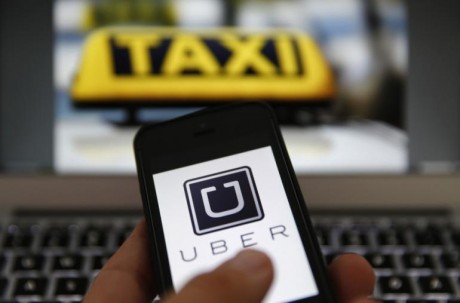Of course, Silicon Valley would be rejoicing. One of their own, ride sharing network operator Uber, has recently been granted legal status in the Philippines. This development offers a ray of hope for embattled Uber which has been subject to strong pushback across Asia thanks to public transport operators, specifically taxi fleet operators, who feel threatened by the additional competition they bring to the markets they once practically monopolised.

According to Jun Abaya secretary of the Philippines’ Department of Transportation and Communication (DOTC), “App-based transport services help address the increasing demand for mobility spurred by rapid urbanization.”
| SUPPORT INDEPENDENT SOCIAL COMMENTARY! Subscribe to our Substack community GRP Insider to receive by email our in-depth free weekly newsletter. Subscribe to our Substack newsletter, GRP Insider! Learn more |
What Abaya does not mention, however, is that the Philippines’ public transport services are basically a chaotic mishmash of private operators pretty much left to their devices. “Regulation” may be a word enshrined in city ordinances all over the archipelago, but like everything else concerning rules in the Philippines, it is all form wrapping very little substance. It also helps to note that under Abaya’s watch, the Philippines’ once-modern commuter train systems have deteriorated beyond recognition, which puts into perspective his quickness to embrace this shallow “win” for the Philippine government.
The Philippines’ public transport system defies systematisation thanks to a transport franchising approach that dates back to post World War II settings when desperation rather than thinking drove the “development” of public transport services. Back then, derelict US Army jeeps were put to use to address the commuting needs of Filipinos scraping together livelihoods in devastated cities. Unfortunately, that stroke of “ingenuity” stuck as a source of national “pride” and the “jeepney” became both a source of national identity and a cornerstone of the Philippines’ automotive industry.
Today, the jeepney remains the pre-eminent operating model at all scales of the Philippines public transport infrastructure. From the large buses that ply the country’s main thoroughfares down to the smallest tricycles and pedicabs that serve smaller streets, the Philippines’ monstrous decrepit fleet of “public utility vehicles” (PUVs) scramble on top one another to scoop up paying passengers from sidewalks in a frenzy of dog-eat-dog entrepeneurship that Filipinos call their public transport “system”. There are no schedules or optimised routing systems. Even the country’s relatively-modern commuter train system is operated and maintained on a hope-for-the-best basis.
Uber vehicles and their drivers will merely add to the scramble. The new transport network’s veneer of “modern” technological gloss is really nothing more than an automated version of the human hawkers and dispatchers that infest the thousands of formal and informal PUV stops and terminals that dot the Philippines’ congested cities. For the Philippines’ growing class of Smartphone warriors, taps on touchscreens would now replace hand signals ordinary peasants haplessly throw from the roadside, much like the way urbane Filipinos set themselves apart from the masses who eat with their hands.
For now, using the Philippines as a poster child to herald “another” triumph of the latest “technology solutions” over the human condition is a public relations coup for Uber. It remains to be seen, of course, but there is wisdom in the old saying; that automating a flawed manual process can only take one so far and may likely create the same sort of unintended consequences techos who are beholden to their technological marvels often fail to foresee.
- “Press freedom” activists and leftist groups up in arms over conviction of commie “journalist” Frenchie Mae Cumpio on charges of terrorist financing - January 23, 2026
- Why are Filipinos so irrevocably corrupt? - January 22, 2026
- Vice Ganda for president of the Philippines: just what Filipinos need! - January 17, 2026
Let us all wait and see…if it works:Good. If it does not work: sorry, another problem.
Our political leaders cannot think. They just let the mess pile up. Then, we elect them again to their positions. They win, problems remain as they are and even increase.
yan ang diskarte nila. they get the masses vote dahil ang mga politkong ito eh hinahayaan lang ang mga gustong gawin ng pinoy.
Meh, uber is a vast step up from your taxi and much more secure. Uber is NOT public transport, you will have to compare it to current taxi services.
Overall its a wash for non-paying customers and for customers its a big win.
http://en.wikipedia.org/wiki/Uber_(company)#Philippines
Philippines
On October 23, 2014, despite the recommendation of the Metropolitan Manila Development Authority, the Philippine Land Transportation Franchising and Regulatory Board (LTFRB) imposed a ₱120,000 (US$2,676) to ₱200,000 (US$4,460) fine for the use of the Uber app on public utility vehicles and sedans, respectively. A spokesperson for the board said that the fines were issued because Uber did not have an approved franchise to operate in the country—they were not directed at the service itself. The LTFRB also remarked that Uber can still operate in Metro Manila if the Philippine House of Representatives grants the company a proper legislative franchise, saying “We want this scheme work in the Philippines because the application is good, but it has to work inside the context of Philippine laws.”
On October 30, 2014, after an intervention from the Department of Transportation and Communications, the LTFRB temporarily suspended its campaign of apprehending Uber vehicles and will review its operations.
On May 12, 2015, the Philippines established regulations for ride-sharing apps, like Uber, making it the first country to do so.
====
The Philippines doing something and being the first country in the world. This is really shocking to hear/read.
ITs not something to be all “proud to be pinoy” for though